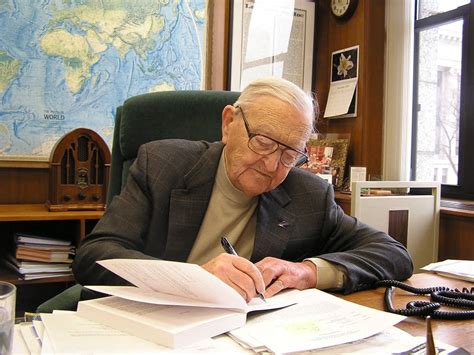A Quote by Gerald Heaney
If Moses is our lawgiver [Old Testament prophet given laws by God] at this time let us obey him, not in part only, but wholly, and put every Sabbath breaker, blasphemer, and adulterer to death.
Related Quotes
Let us serve Him faithfully as our Master. Let us obey Him loyally as our King. Let us study His teachings as our Prophet. Let us work diligently after Him as our Example. Let us look anxiously for Him as our coming redeemer of body as well as soul. But above all let us prize Him as our Sacrifice, and rest our whole weight on His death as atonement for sin. Let His blood be more precious in our eyes every year we live. Whatever else we glory in about Christ, let us glory above all things in His cross.
There are two kinds of death, the death which is inevitable and common to all beings, and the death which is voluntary and particular to certain ones of them only. It is the second death which is prescribed for us in the words of the Messenger of Allah: "Die before you die." The resurrection is accomplished for him who dies this voluntary death. His affairs return to God and they are but one. He has returned to God and he sees Him through Him. As the Prophet said - on him be Grace and Peace!
Our most merciful Father, seeing us to be oppressed and overwhelmed with the curse of the law . . . sent his only Son into the world and laid upon him all the sins of all men, saying, 'You be Peter that denier, Paul that persecutor, blasphemer and cruel oppressor, David that adulterer, that sinner who ate the apple in Paradise, that thief who hung upon the cross, and briefly, you be the person who has committed the sins of all men. See therefore that you pay and satisfy for them.'
It's not as if the New Testament writers came along and said, "The culmination of Old Testament books is more books, New Testament books." In some ways they thought instead of the culmination of Old Testament books being Christ himself, the word incarnate as the opening verses of Hebrews 1 put it. In the past God spoke to the fathers by the prophets, but in these last days he has spoken to us by his son and the son is revelation.
We trample the blood of the Son of God underfoot if we think we are forgiven because we are sorry for our sins. The only reason for the forgiveness of our sins by God, and the infinite depth of His promise to forget them, is the death of Jesus Christ...No matter who or what we are, God restores us to right standing with Himself only by means of the death of Jesus Christ...To identify with the death of Jesus Christ means that we must die to everything that was never a part of Him.
We go from Malachi to Matthew in one page of our scriptures, but that one piece of paper that separates the Old Testament from the New Testament represents 400 years of history - 400 years where there wasn't a prophet, 400 years where God's voice wasn't heard. And that silence was broken with the cry of a baby on Christmas night.
The laws of Nature, that is to say the laws of God, plainly made every human being a law unto himself, we must steadfastly refuse to obey those laws, and we must as steadfastly stand by the conventions which ignore them, since the statutes furnish us peace, fairly good government, and stability, and therefore are better for us than the laws of God, which would soon plunge us into confusion and disorder and anarchy if we should adopt them.
Our obedience is God's pleasure when it proves that God is our treasure. This is good news, because it means very simply that the command to obey is the command to be happy in God. The commandments of God are only as hard to obey as the promises of God are hard to believe. The Word of God is only as hard to obey as the beauty of God is hard to cherish.
On closer inspection, the hero status accorded to Abraham, Moses and David in the Old Testament (and echoed in the New Testament) is rooted not in their moral perfection but in their uncompromising dedication to the cause of Yahweh and their rugged trust in the promises of God rather than lapsing into the idolatry of many of their contemporaries.
No single character is ever so great that a nation can afford to form itself upon it. Imitation belittles. This appears in the instance of the Chinese. The Chinese are so many Confucii; in miniature. And so with the Jews. Moses, the lawgiver, is poorly represented by Moses, the old clothesman ; or even by Dives, the hanker.
But his Lordship [tells]us that God is wholly here, and wholly there, and wholly every where; because he has no parts. I cannot comprehend nor conceive this. For methinks it implies also that the whole world is also in the whole God, and in every part of God. Norcan I find anything of this in the Scripture. If I could find it there, I could believe it; and if I could find it in the public doctrine of the Church, I could easily abstain from contradicting it.


































